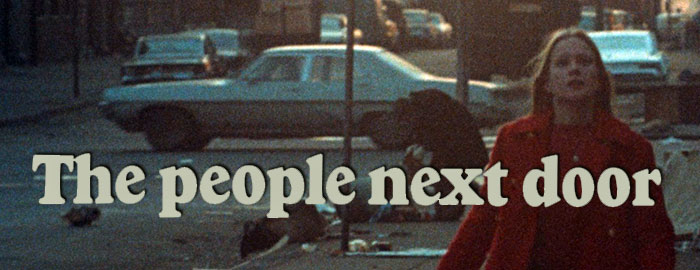
Color, 1970, 85 mins. 39 secs.
Directed by David Greene
Starring Eli Wallach, Julie Harris, Deborah Winters, Hal Holbrook, Cloris Leachman, Nehemiah Persoff, Stephen McHattie, Don Scardino, Rue McClanahan
Indicator (Blu-ray) (UK RB HD), Scorpion Releasing (Blu-ray & DVD) (US RA/R1 HD/NTSC)
/
WS (1.85:1) (16:9)
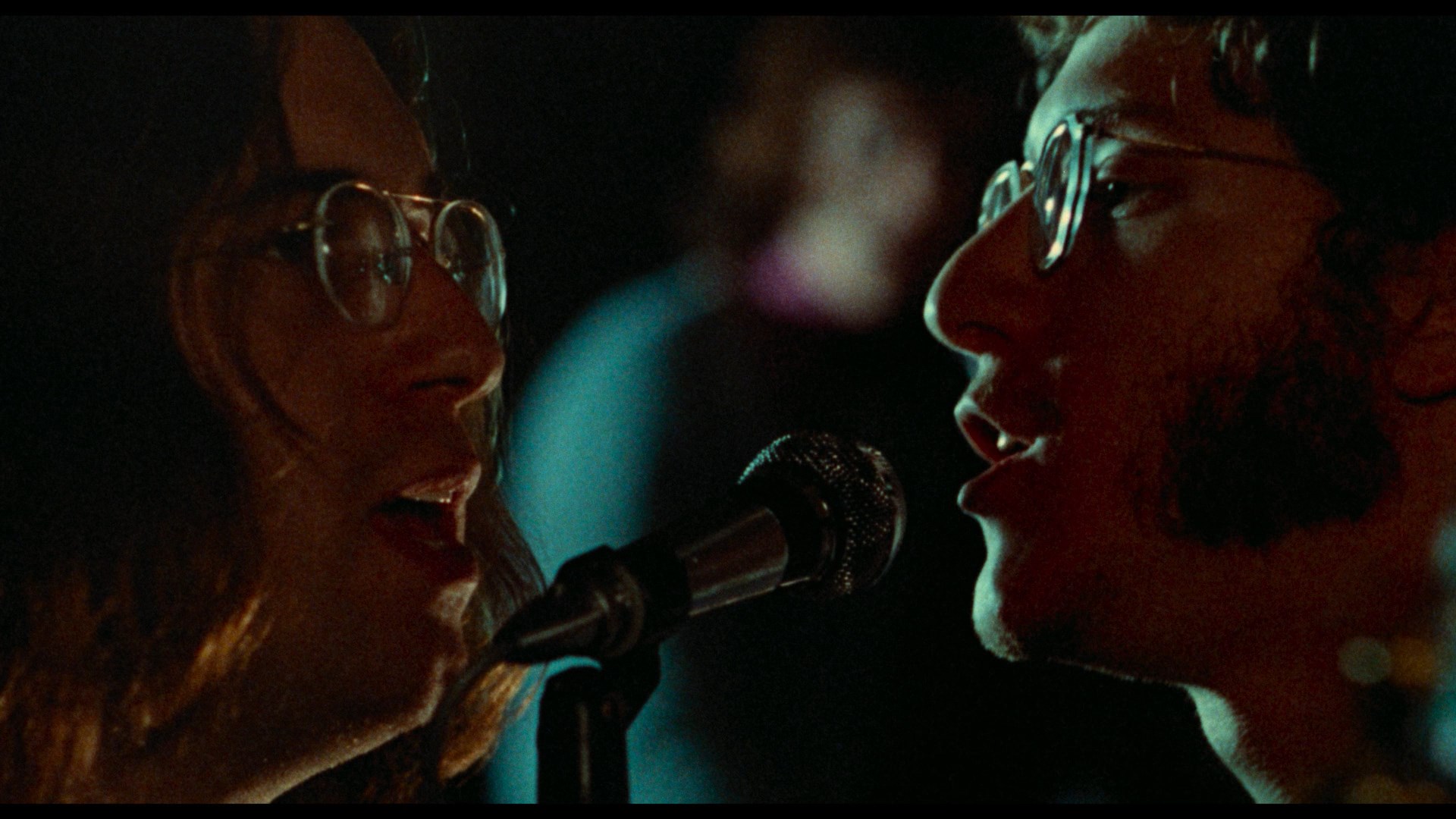 the turn of the next decade just as filmmakers were coming to grips with what could be done with
the turn of the next decade just as filmmakers were coming to grips with what could be done with 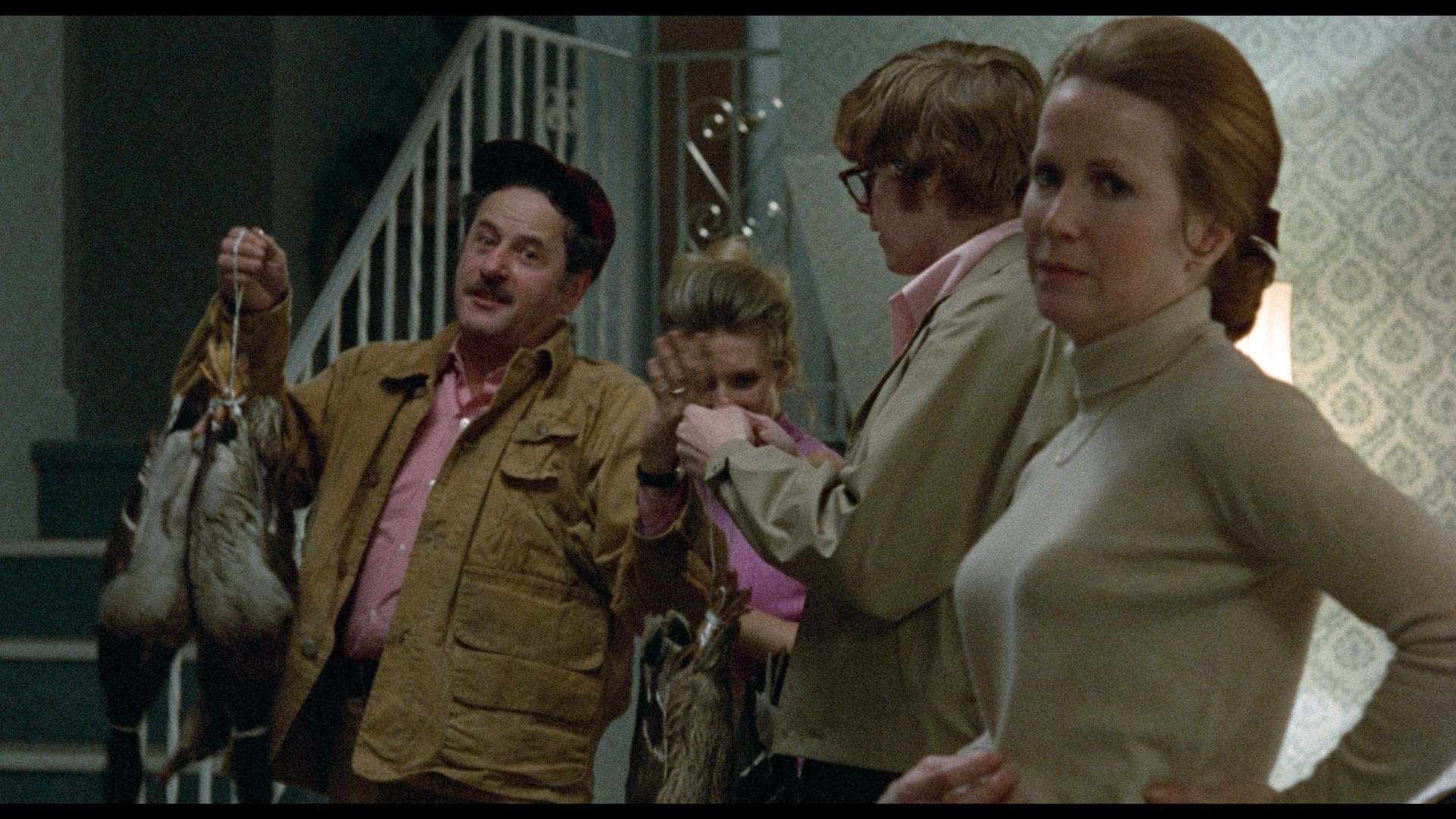 the new MPAA ratings system. Gimme Shelter and Midnight Cowboy are among the most enduring examples, but several others also captured that strange, sad, scary time when the love generation was feeling a door slam shut across the world. One of these, The People Next Door, arrived from Avco Embassy in 1970 with an eye on both the suburbanites who frequented theaters outside the major cities as well as the younger viewers who would enjoy its rock music and portrayal of urban drug culture. The film was fairly well received but not a major box office hit, getting sidelines as rattled ticket buyers instead flocked to fare like Patton, Love Story, and Airport instead. Hot off of his haunting adolescent thriller I Start Counting, British director David Greene would ultimately decry the studio's tinkering with this remake of his own made-for-TV film of the same name from 1968 for CBS Playhouse, both written by J.P. Miller (Days of Wine and Roses, Helter Skelter) and sharing three of the same cast members, Deborah Winters, Don Scardino, and Nehemiah Persoff. After a very early and rare VHS release from Magnetic Video, the film fell into oblivion for decades but has finally been resurrected by Studio Canal with simultaneous Blu-ray release in the U.K. and the U.S.
the new MPAA ratings system. Gimme Shelter and Midnight Cowboy are among the most enduring examples, but several others also captured that strange, sad, scary time when the love generation was feeling a door slam shut across the world. One of these, The People Next Door, arrived from Avco Embassy in 1970 with an eye on both the suburbanites who frequented theaters outside the major cities as well as the younger viewers who would enjoy its rock music and portrayal of urban drug culture. The film was fairly well received but not a major box office hit, getting sidelines as rattled ticket buyers instead flocked to fare like Patton, Love Story, and Airport instead. Hot off of his haunting adolescent thriller I Start Counting, British director David Greene would ultimately decry the studio's tinkering with this remake of his own made-for-TV film of the same name from 1968 for CBS Playhouse, both written by J.P. Miller (Days of Wine and Roses, Helter Skelter) and sharing three of the same cast members, Deborah Winters, Don Scardino, and Nehemiah Persoff. After a very early and rare VHS release from Magnetic Video, the film fell into oblivion for decades but has finally been resurrected by Studio Canal with simultaneous Blu-ray release in the U.K. and the U.S. becomes clear as she treks into the city and indulges in an accelerating drug addiction including extensive dabbling in LSD. Meanwhile the Masons' best friends, married David and
becomes clear as she treks into the city and indulges in an accelerating drug addiction including extensive dabbling in LSD. Meanwhile the Masons' best friends, married David and 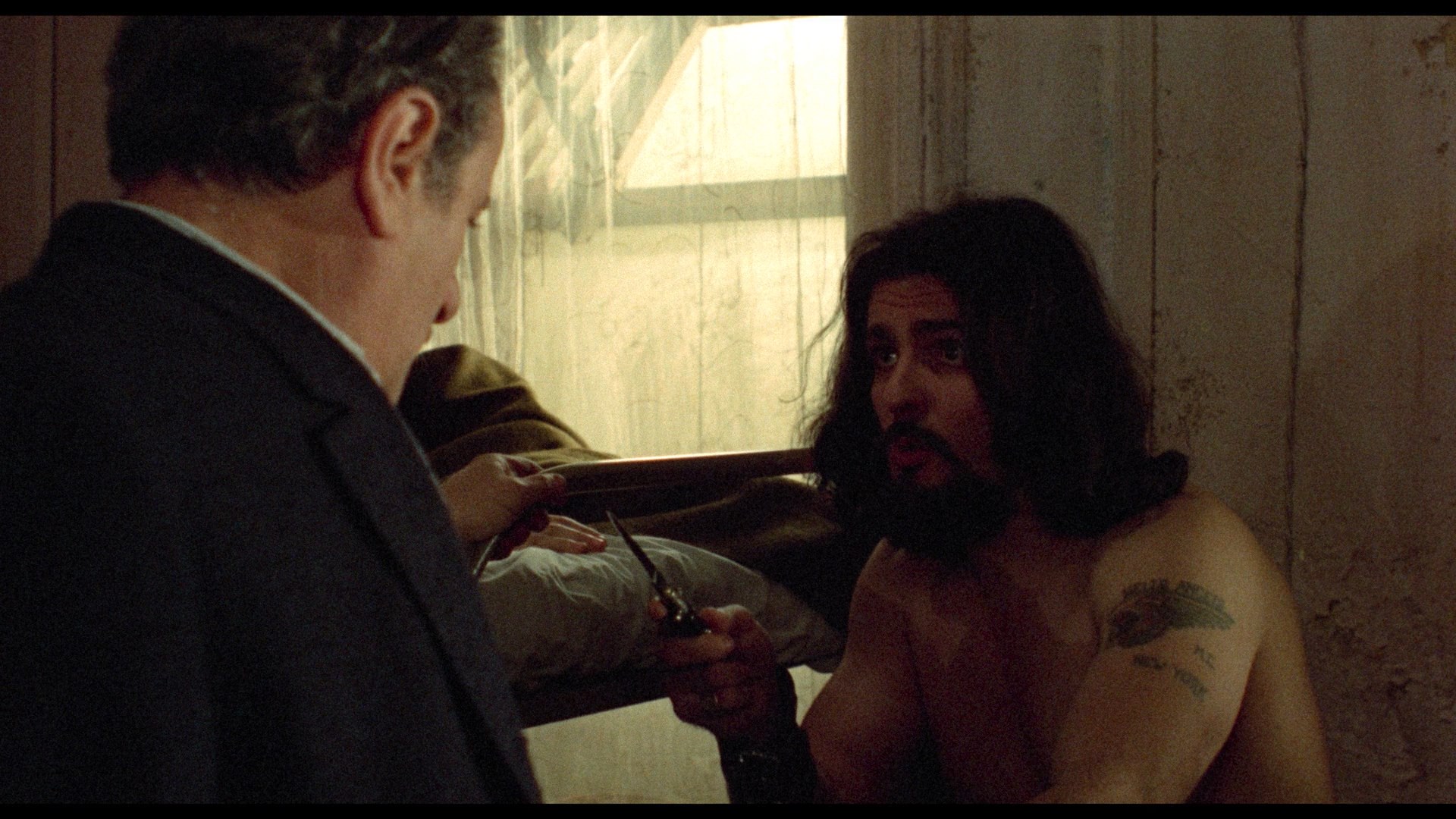 Tina (Holbrook and Leachman), are having issues of their own with their son, Sandy (Scardino), who's secretly dealing out of his car with their own neighbors as his clients. When Maxie has a complete break one night and goes running naked into the snowy street, it's time to take more radical steps that could tear the family apart for good.
Tina (Holbrook and Leachman), are having issues of their own with their son, Sandy (Scardino), who's secretly dealing out of his car with their own neighbors as his clients. When Maxie has a complete break one night and goes running naked into the snowy street, it's time to take more radical steps that could tear the family apart for good.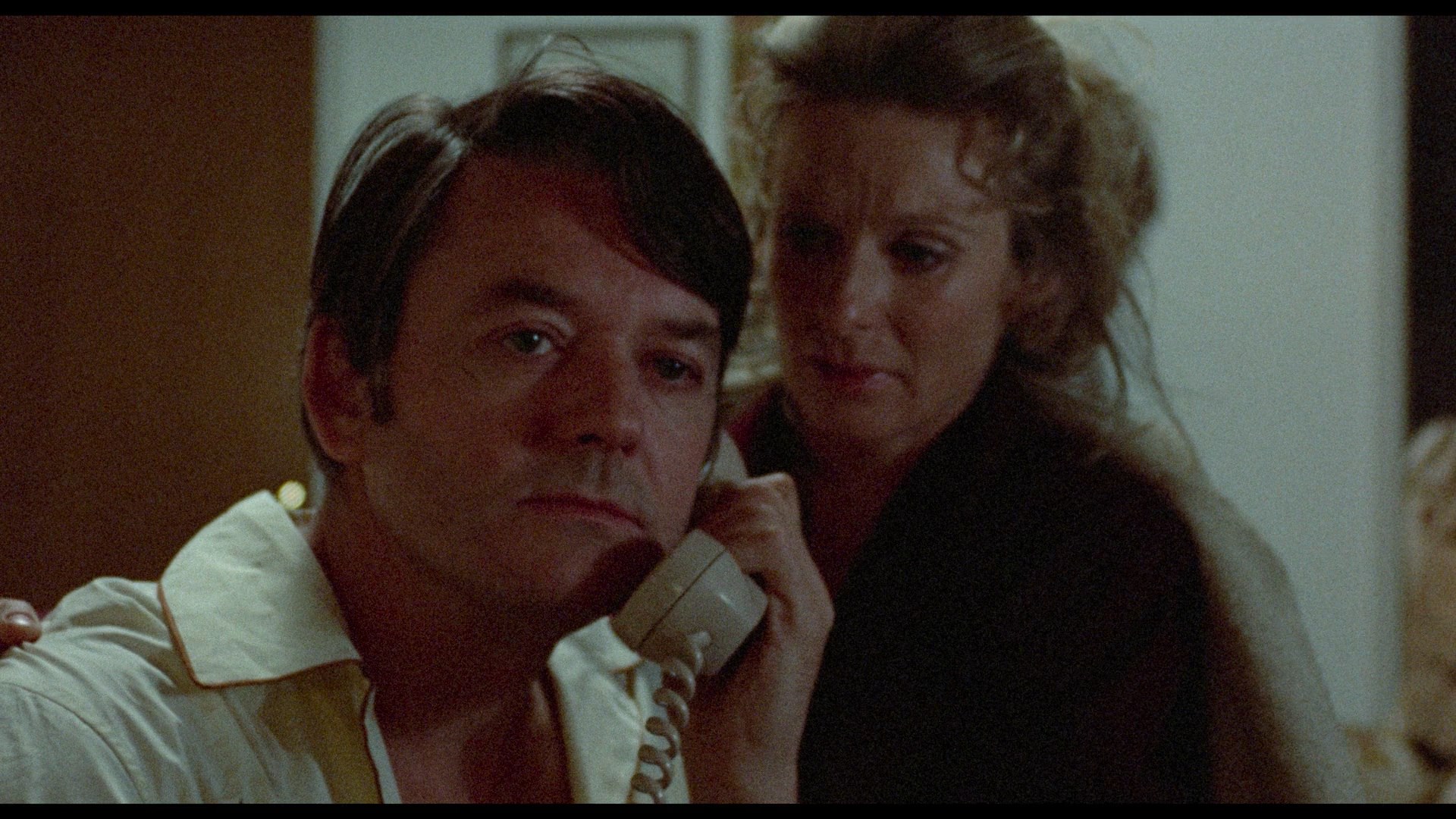 and the LPCM mono audio (with optional English SDH subtitles) is also pristine. The film also comes with a new audio commentary by Lee Gambin and actress Rutanya Aldo, who has a bit part here as a
and the LPCM mono audio (with optional English SDH subtitles) is also pristine. The film also comes with a new audio commentary by Lee Gambin and actress Rutanya Aldo, who has a bit part here as a 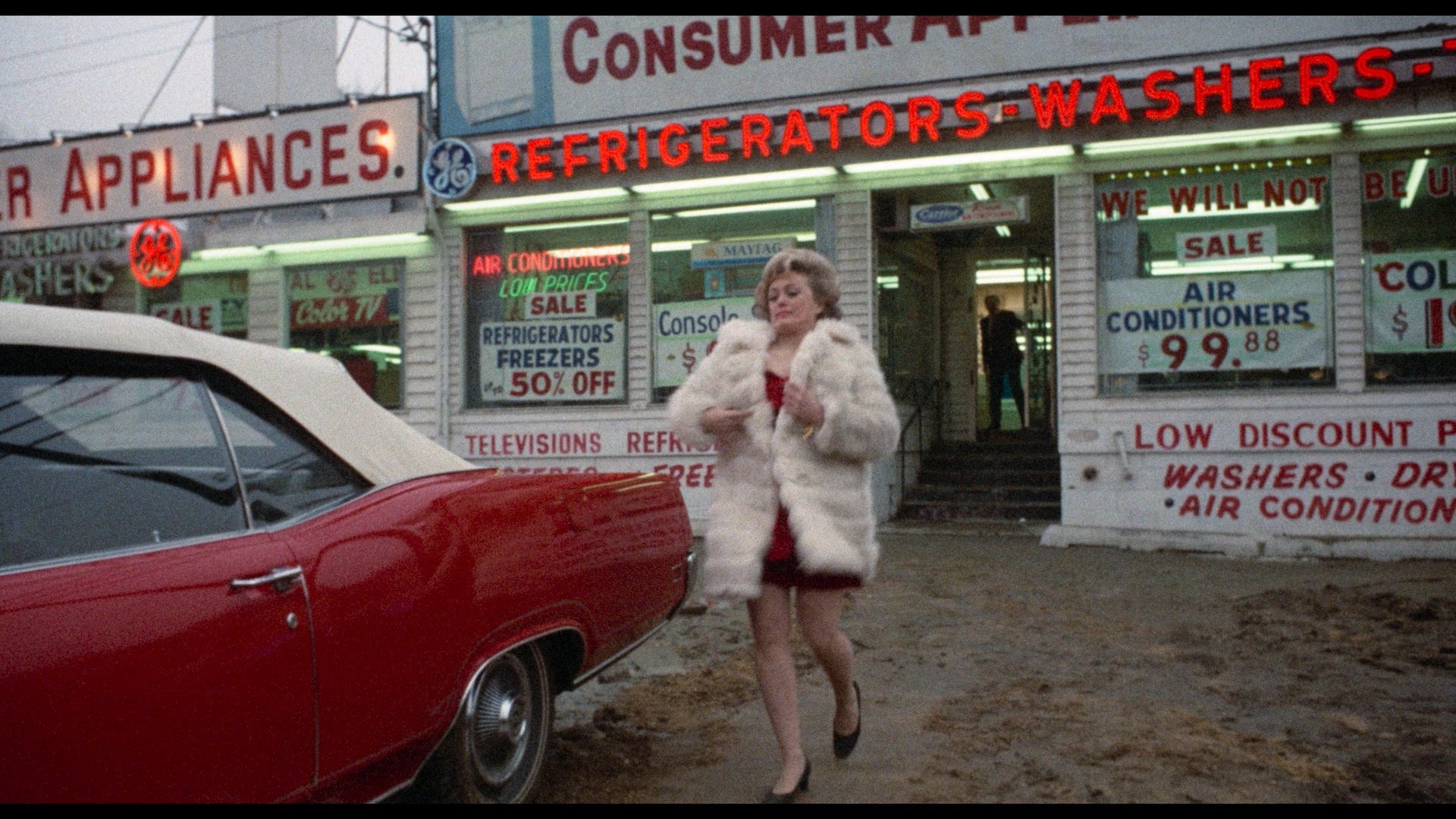 nurse; they've shown great rapport together in the past and do so here as well, mixing research with her recollections of the era and the cast during a pivotal moment in social change. In "Tripping with Maxie" (38m33s), Winters recalls her time as an actress starting off as a child in New York City and working her way up the theater and TV scene, followed by her memories of her fellow cast members (including Leachman tapping into her underused dramatic side) and her own resources to play the challenging role twice in front of the cameras including a couple of scenes that didn't feel terribly hygienic, not to mention shooting inside a real "psychotic hospital." In "Structured How to Feel" (9m15s), supervising editor Brian Smedley-Aston covers his multiple projects with Greene who was very enthusiastic in giving notes with "bags of energy" and paid attention to camera movement more than most. Then the music gets covered in "My Life in Review" (14m44s) with Bead Game musician John Sheldon chatting about his music background in Massachusetts, the founding of the band via Avco Embassy, and his most famous gig with Van Morrison. Note that all of these were conducted over Zoom or Skype and understandably vary in quality. Finally in "People Person" (18m39s), film historian Vic Pratt takes an overall survey of Greene's career including his juggling of offbeat projects with mainstream ones encompassing everything from I Start Counting to Godspell to Gray Lady Down, with his equally important work for TV including Roots and Rich Man, Poor Man all reflecting his commitment to progressive social causes. Finally the disc wraps up with an image gallery featuring promotional stills and artwork, while the limited 3,000-unit edition comes with a 36-page booklet featuring an essay by Peter Tonguette about the film's place in the shifting tide of social issue films, a look at the edgy TV version, an archival interview with Wallach, notes on the soundtrack album (also released by Avco Embassy, and sample critical reactions. Though not yet available for comparison, the U.S. disc from Scorpion Releasing comes with an audio commentary by Bill Ackerman and a video interview with Scardino.
nurse; they've shown great rapport together in the past and do so here as well, mixing research with her recollections of the era and the cast during a pivotal moment in social change. In "Tripping with Maxie" (38m33s), Winters recalls her time as an actress starting off as a child in New York City and working her way up the theater and TV scene, followed by her memories of her fellow cast members (including Leachman tapping into her underused dramatic side) and her own resources to play the challenging role twice in front of the cameras including a couple of scenes that didn't feel terribly hygienic, not to mention shooting inside a real "psychotic hospital." In "Structured How to Feel" (9m15s), supervising editor Brian Smedley-Aston covers his multiple projects with Greene who was very enthusiastic in giving notes with "bags of energy" and paid attention to camera movement more than most. Then the music gets covered in "My Life in Review" (14m44s) with Bead Game musician John Sheldon chatting about his music background in Massachusetts, the founding of the band via Avco Embassy, and his most famous gig with Van Morrison. Note that all of these were conducted over Zoom or Skype and understandably vary in quality. Finally in "People Person" (18m39s), film historian Vic Pratt takes an overall survey of Greene's career including his juggling of offbeat projects with mainstream ones encompassing everything from I Start Counting to Godspell to Gray Lady Down, with his equally important work for TV including Roots and Rich Man, Poor Man all reflecting his commitment to progressive social causes. Finally the disc wraps up with an image gallery featuring promotional stills and artwork, while the limited 3,000-unit edition comes with a 36-page booklet featuring an essay by Peter Tonguette about the film's place in the shifting tide of social issue films, a look at the edgy TV version, an archival interview with Wallach, notes on the soundtrack album (also released by Avco Embassy, and sample critical reactions. Though not yet available for comparison, the U.S. disc from Scorpion Releasing comes with an audio commentary by Bill Ackerman and a video interview with Scardino.